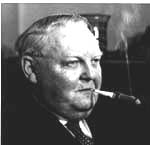 |
Ludwig Erhard, Germany's "Economic Miracle" Man, Turns 100
 A
large, jovial man seldom seen without a cigar, Ludwig Erhard has
gone down in German history as the engineer of Germany's
Wirtschaftswunder, the extraordinary economic revival after the
Second World War.
A
large, jovial man seldom seen without a cigar, Ludwig Erhard has
gone down in German history as the engineer of Germany's
Wirtschaftswunder, the extraordinary economic revival after the
Second World War.
Erhard was born the son of a textile merchant in Fürth (Bavaria) one hundred years ago, on February 4, 1897. After serving in the First World War, he studied economics with Franz Oppenheimer and was strongly influenced by Oppenheimer's ideas of "liberal socialist" economic policy that attempted to steer a middle path between socialism and liberalism. He spent the war years as a researcher at economics institutes. At the last of these, the "Institute for Industrial Research," industrialists who foresaw Germany's eventual defeat asked him to draw up secret plans for rebuilding the German economy and repaying the immense war debt. Completed in March 1944, Erhard's "Memorandum on War Financing and Debt Consolidation" so impressed Carl Goerdeler, one of the leading figures of the July 20, 1944 assassination attempt upon Hitler, that he recommended Erhard be part of the reconstruction of Germany after Hitler was killed.
Though the assassination failed, Erhard's "Memorandum" did in the end find an appreciative audience. It was discovered by the American forces, who made him their economic advisor for Franconia (Bavaria). By 1947, he was a member of the groups that planned currency reform and a new start for the German economy in the western occupation sectors that became the Federal Republic two years later. In 1948, Erhard became director for economic policy in the joint administration of the three western zones. In this capacity, he was largely responsible for managing the currency reform that took place in June 1948. Each citizen in the western zones received forty DM, rationing was abolished and prices were freed.
On July 15, 1949, the Christian Democratic Union (founded in 1947) incorporated Erhard's economic strategies into their party platform. Erhard ran for the Bundestag in the new republic's first parliamentary elections, held one month later, and won a seat from the state of Baden-Württemberg. Very shortly after that, on September 20, 1949, he was named minister of economics in the first postwar German cabinet under Chancellor Konrad Adenauer, a position he held until 1963.
The soziale Marktwirtschaft (social market economy) created by Erhard and Adenauer, and grounded theoretically in the work of economist Walter Eucken and lhis "Freiburg School" -- was not "pure" capitalism. From the beginning -- and in reaction to the class warfare of the Weimar period -- it was strongly influenced by the Catholic social teachings that had been the legacy of the Zentrumspartei, the forerunner of the CDU. Labor and capital were established as equal partners; consensus and co-determination became principles of industrial management. In an astonishingly short time, the German economy was booming and Germany had regained a measure of credibility and acceptance in the outside world.
Erhard succeeded Konrad Adenauer as chancellor in 1963 and held that office until 1966. From 1966 until his death in 1977, he was national chairperson of the CDU and a member of the Bundestag.
Copyright: German Information Center, January 28, 1997